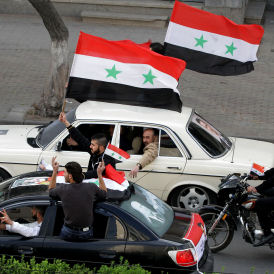Syrian Government resigns after protests
Syrian President Bashar al-Assad has accepted the resignation of the government. It follows protests across the country which have left dozens dead.

“President Assad accepts the government’s resignation,” an announcement on state television said.
Assad was expected to address the nation later on Tuesday or Wednesday in a speech which may include a decision to abolish emergency laws.
Dozens of people have been killed in violent protests in Deraa, Damascus and Latakia since the middle of March.
Bashar al-Assad has been under increasing pressure to lift emergency laws that have been used since 1963 to stifle political opposition.
Read more: Arab revolt - Middle East uprisings
As news emerged that the Government was to resign, Syrian state television showed thousands of supporters of Assad taking to the streets of Damascus.
Deadly demonstrations
The agricultural town of Deraa in the south of Syria has been home to the country’s uprising.
Crowds converged in the main square on Monday, chanting: “We want dignity and freedom” and “No to emergency laws”.
Security forces fired sustained bursts into the air for several minutes in the direction of demonstrators, but the protesters returned once firing stopped, residents said. It was not immediately clear if there had been casualties.
Assad’s crackdown on what his officials say are armed groups has drawn international condemnation as protesters, emboldened by uprisings in Tunisia and Egypt, confronted the security system of one of the most tightly controlled Arab countries.
President Barack Obama’s deputy national security adviser said the United States expected the Syrian Government to respect the rights of Syrians to demonstrate peacefully.
Secretary of State Hillary Clinton said events in Syria were “deeply concerning” but ruled out Libya-style intervention.
A statue of the late president Hafez al-Assad, the President’s father, was toppled last week before security men in plain clothes opened fire with automatic rifles from buildings.
People have also turned out on the streets of Hama, where in 1982 the forces of Hafez al-Assad killed thousands of people and razed much of the old quarter to crush an armed uprising by the Islamist Muslim Brotherhood.